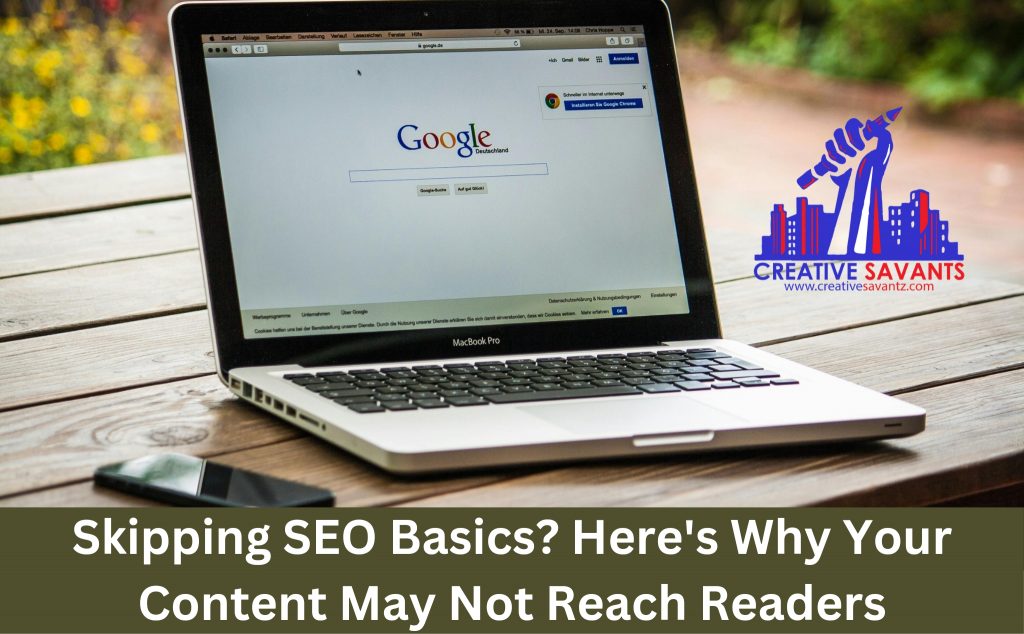The biggest challenge for writers and webmasters today is to help their content rank. Sometimes, there is nothing more heartbreaking than seeing after spending hours generating quality, that it doesn’t get the ranking or visibility that it deserves.
But have you ever wondered what could be the reason for readers to back up from your website?
If you think your content has the potential to rank, then to me, skipping SEO basics is one reason behind this lack of visibility.
Read more: Crafting SEO Headlines: Tips for Creating Click-Worthy Title headings for SEO
It can be wrong keyword research, poor linking, irrelevant content, or plagiarized information. So, keep reading to learn more and identify the main culprit behind your lackluster results.
Not Targeting The Right Keyword
Keywords are terms that audiences use to find information. You might write high-quality content but overlook keyword inclusion, assuming the topic alone is enough. Without targeted keywords, though, your content may never reach search results, even if it’s relevant
Think of it this way, when you ignore keyword research, you cut off potential readers. Keywords act as signposts that guide search engines to your content. Without them, you risk making your work practically invisible.
Well, there is another scenario as well.
Yes, I admit I have mentioned that good keyword research is important for ranking. However, if you target too competitive keywords then, trust me, it’s nearly nerve-racking to rank first on SERPs.
Have a look at: 10 Essential SEO Content Writing Techniques You Need to Master in 2024
Why? Because there are already so many authoritative websites securing their positions on the first page. So, go for medium or low-competition keywords to make your work worth the effort.
In summary, neglecting keyword research or opting for a high-competition keyword can cause more stress than success.
Lack of Internal And External Links
When it comes to link building, both internal and external linking are equally important to improving a website’s domain authority in SEO.
So, let’s first discuss external linking.
Google’s algorithms analyze and rank a website based on its relevance and domain authority. This score can easily be counted by checking many authoritative web pages that point back to your website, this is known as external links.
Websites with weak backlink portfolios have lower domain authority, so they struggle to rank higher. Therefore, website owners sometimes accept whatever backlink is offered to them.
Do check out: Why Internal Linking is Crucial for Your SEO Content Strategy and How to do It?
Notably, if you backlink to a poor-quality or scam website, it can negatively impact your website’s credibility and ranking. Hence, it’s necessary to choose your linking website wisely.
Now, it’s time for internal linking.
Internal links are necessary to connect your web pages, thus it makes navigation within the website easier. Google’s algorithms rely on internal links to understand page relationships on your site. Thus, this approach ultimately leads to better SERP ranking.
Moreover, according to Yoast Google’s algorithm uses internal links to divide up the link value of a website. Therefore, it’s necessary to add internal links to relevant web pages and posts to improve your visibility on Google.
Irrelevant Published Content
No matter how good your published content is, it won’t get any clicks if it doesn’t resonate with the user’s needs and queries.
Therefore, whenever you write something, first ask yourself, “Does my audience want to read about and engage with this topic?” “Have I covered it properly?” “Is there anything else my reader wants to know?” Then, draft your ideas based on these queries.
Read more: Understanding the Basics of SEO- Creating Content that Drives Traffic
Once you’ve completed your draft, assess whether it relates to the user queries and your assessments. Remember, a good article is the one that instantly grabs readers’s attention and convinces them to take action.
Duplicate or Outdated Content
One of the major reasons your content is not ranking or appearing on the search engine is that it might be plagiarized or outdated.
If you have duplicate content on your website, either it’s your own content or copied from someone else Google won’t rank it. Why? Because Google doesn’t know which one is original, as a result, both the authentic and copied work will result in lackluster ranking.
Check out: Best AI Writing Tools for Academic Writing
So, to avoid such situations, always pass your content through a reliable plagiarism checker to check for plagiarism before publishing. These tools are designed to compare your writing with other published content on Google and red-flag any similarities between the two to avoid duplications.
On the other hand, even if your content is original, if it’s not up-to-date, it’s useless to search engines and users. Therefore, if you want to boost your website’s ranking on Google, regularly update it to keep it relevant to market needs. Whenever you want to update an already published article, you should first audit it thoroughly and evaluate metrics such as:
- Current rank
- Targeted keyword
- Monthly Traffic
- Time on site
- Bounce rate
- Engagement
Have a look at: Paraphrasing in SEO- How to Boost Your Website’s Online Presence Organically
This approach helps you determine whether you need to rewrite it from scratch or just require a few tweaks.
Skipping SEO Basics: Overseeing On-Page SEO
On-page optimization improves individual page rankings. Title tags, meta descriptions, headers, and image alt text all serve as specific SEO functions. Each component helps search engines understand your page content. Thus, ignoring any of these elements can limit your page’s effectiveness.
For instance, your title tag provides the first impression for search engines and users. While an optimized title tag tells readers what to expect from the article. Meta descriptions provide a brief preview, to boost your CTR. Similarly, headers organize your content which allows search engines to read your article structure more effectively.
Read more: Structuring a Blog Article: Blog Post Examples and Strategies to Inspire you
Thus, on-page optimization may seem minor, yet it plays a big role in how well your content performs. Each optimized element guides readers and search engines, increasing your reach and improving the user experience.
No Mobile Optimization
Nowadays, most users search for content on their mobiles instead of using a computer. Optimizing your website for mobile is essential.Google understands this shift and favors mobile-friendly sites in its search results, which means sites with mobile-optimized interfaces rank higher.
Why?
If your website isn’t mobile-friendly, it may display poorly on mobile devices, frustrating users who may leave without reading your content. To avoid this, ensure a responsive design that adapts well to different screen sizes, enhancing the experience for mobile users and boosting your rankings.
Check out: The basics of SEO: Google is not a mind reader
Wrap Up
Skipping SEO basics lowers your ranking and visibility. Without targeted keywords, search engines can’t match your content to searches. Missing title tags, poor structure, and lack of links reduce clicks and credibility, while a non-mobile-friendly site drives users away. Each missed SEO step weakens relevance and limits your audience.



